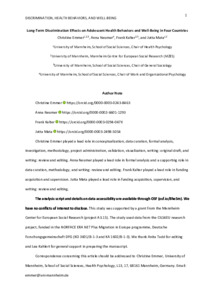|
Long-term discrimination effects on adolescent health behaviors and well-being in four countries
Emmer, Christine
;
Neumer, Anna
;
Kalter, Frank
;
Mata, Jutta
![[img]](https://madoc.bib.uni-mannheim.de/69591/1.hassmallThumbnailVersion/Manuscript_Emmer%20et%20al_Long-term%20discrimination%20effects%20on%20adolescent%20health%20behaviors%20and%20well-being%20in%20four%20countries_2025.pdf)  Vorschau |
|
PDF
Manuscript_Emmer et al_Long-term discrimination effects on adolescent health behaviors and well-being in four countries_2025.pdf
- Angenommene Version
Download (457kB)
|
|
DOI:
|
https://doi.org/10.1037/hea0001496
|
|
URL:
|
https://psycnet.apa.org/record/2025-99346-001
|
|
URN:
|
urn:nbn:de:bsz:180-madoc-695916
|
|
Dokumenttyp:
|
Zeitschriftenartikel
|
|
Erscheinungsjahr:
|
2025
|
|
Titel einer Zeitschrift oder einer Reihe:
|
Health Psychology
|
|
Band/Volume:
|
44
|
|
Heft/Issue:
|
9
|
|
Seitenbereich:
|
854-865
|
|
Ort der Veröffentlichung:
|
Washington, DC
|
|
Verlag:
|
American Psychological Association
|
|
ISSN:
|
0278-6133 , 1930-7810
|
|
Sprache der Veröffentlichung:
|
Englisch
|
|
Einrichtung:
|
Fakultät für Sozialwissenschaften > Arbeits- u. Organisationspsychologie (Sonnentag 2010-)
Fakultät für Sozialwissenschaften > Allgemeine Soziologie (Kalter 2009-)
Außerfakultäre Einrichtungen > MZES - Arbeitsbereich A
Fakultät für Sozialwissenschaften > Gesundheitspsychologie (Mata 2015-)
|
|
Fachgebiet:
|
150 Psychologie
300 Sozialwissenschaften, Soziologie, Anthropologie
|
|
Freie Schlagwörter (Englisch):
|
(social) discrimination , health disparities , health behavior , adolescent health
|
|
Abstract:
|
Objective: Adolescence is a pivotal foundation for lifelong health and a phase vulnerable to the adverse effects of discrimination. We assessed the impact of perceived discrimination on adolescent well-being over 2 years and the mediating effects of protective (physical activity, nutrition, sleep) and risky (substance use) health behaviors.
Methods: Adolescents (N = 9,957; Mage = 14.90 years) from the CILS4EU multinational panel (a longitudinal survey in four European countries) were examined across three waves. Direct and indirect relationships were analyzed using path models, adjusting for health behaviors, well-being, and control variables (age, gender, socioeconomic status, migration, religion) assessed in Wave 1.
Results: Adolescents reported the most discrimination instances within the school environment. Perceived discrimination at Wave 1 was significantly associated with decreased well-being at Wave 3 (β = -.04, p < .001) and decreased protective (physical activity: β = -.02, nutrition: β = -.04, sleep: β = -.04) and increased risky (substance use: β = .03) health behaviors at Wave 2. Nutrition and sleep mediated the relationship between perceived discrimination and well-being; no mediation was found for physical activity and substance use.
Conclusions: Even in observational data with 1-year assessment intervals, detrimental long-term effects of perceived discrimination on adolescent well-being are apparent, mediated through changes in nutrition and sleep behaviors. These results extend previous research—predominantly focusing on substance use—showing that perceived discrimination also predicted fewer protective health behaviors. Adolescence represents a strategic window for addressing discrimination and promoting healthy behaviors and well-being to mitigate long-term health disparities.
|
 
 | Dieser Eintrag ist Teil der Universitätsbibliographie. |
 | Das Dokument wird vom Publikationsserver der Universitätsbibliothek Mannheim bereitgestellt. |
 Suche Autoren in Suche Autoren in
BASE:
Emmer, Christine
;
Neumer, Anna
;
Kalter, Frank
;
Mata, Jutta
Google Scholar:
Emmer, Christine
;
Neumer, Anna
;
Kalter, Frank
;
Mata, Jutta
ORCID:
Emmer, Christine  ORCID: 0000-0003-0243-8463 ORCID: 0000-0003-0243-8463 ; Neumer, Anna ; Kalter, Frank ; Mata, Jutta  ORCID: 0000-0003-2498-5054 ORCID: 0000-0003-2498-5054
Sie haben einen Fehler gefunden? Teilen Sie uns Ihren Korrekturwunsch bitte hier mit: E-Mail
Actions (login required)
 |
Eintrag anzeigen |
|
 ORCID: 0000-0003-0243-8463 ; Neumer, Anna ; Kalter, Frank ; Mata, Jutta
ORCID: 0000-0003-0243-8463 ; Neumer, Anna ; Kalter, Frank ; Mata, Jutta  ORCID: 0000-0003-2498-5054
ORCID: 0000-0003-2498-5054





 Suche Autoren in
Suche Autoren in